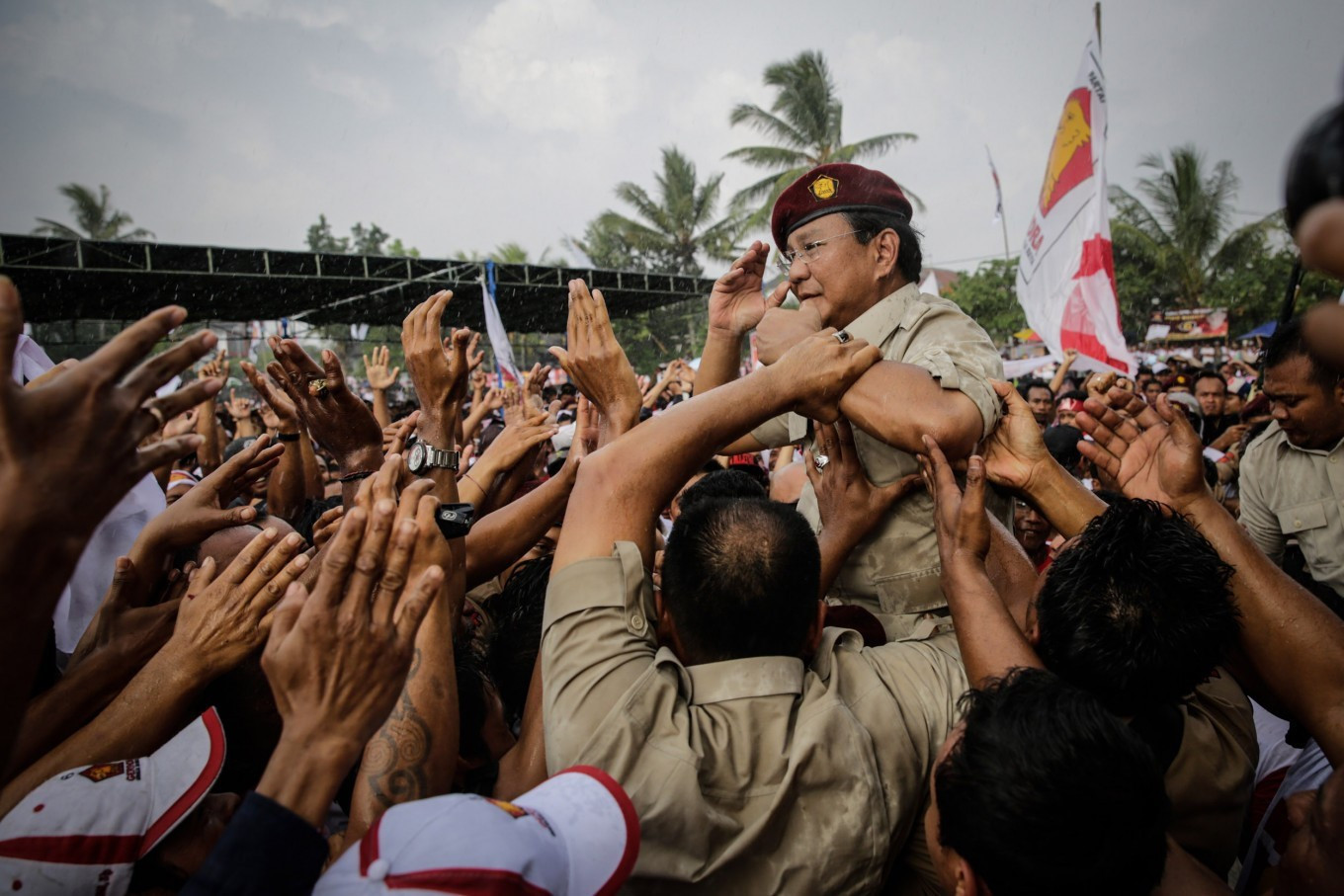News
Political fairy tale: Gerindra’s defining steps to glory
Tenggara Strategics August 18, 2025 Prabowo Subiyanto (center) smiles in the middle of crowd after he speak to supporters during the Gerindra Party campaign rally in Tabanan, Bali on Monday 17 March 2014. The Gerindra Party became the leading opposition party after the 2014 general election. (JP/Agung Parameswara)
Prabowo Subiyanto (center) smiles in the middle of crowd after he speak to supporters during the Gerindra Party campaign rally in Tabanan, Bali on Monday 17 March 2014. The Gerindra Party became the leading opposition party after the 2014 general election. (JP/Agung Parameswara)
Gerindra, President Prabowo Subianto 's political party, is the third largest in the country, trailing only behind the nation's oldest party Golkar and the Indonesian Democratic Party of Struggle (PDI-P). For Gerindra to propel itself to the top in the 2029 elections, Prabowo must maintain his dual role as party chairman and the President.
Two weeks ago, Prabowo shook up his party by replacing its long-serving secretary-general Ahmad Muzani with Sugiono, 46, the incumbent foreign minister. Widely regarded as Prabowo’s “ideological son”, Sugiono is now formally the party’s second-in-command.
Muzani, who is also Speaker of the People’s Consultative Assembly (MPR), has embraced this new chapter and donned two party caps: secretary of the advisory board and chairman of the honorary council.
Gerindra also replaced treasurer Thomas Djiwandono with his deputy, Satrio Dimas Adityo. Thomas, who is Prabowo’s nephew, currently serves as first deputy finance minister and is widely speculated to be promoted to finance minister in a highly anticipated cabinet reshuffle.
Analysts view this internal restructuring as Gerindra’s attempt at self-rejuvenation ahead of the next legislative election in 2029. The party currently holds 86 seats at the House of Representatives, while Golkar has 102 and the PDI-P has 110. Its internal shake-up serves as a clear warning to the leading two parties: Gerindra is aiming to claim the throne in four years.
While President Prabowo wields total control over the legislature through his massive coalition government and a recent political deal with the PDI-P, the only de facto opposition of his administration, his ambitions to push Gerindra to the top are clear.
But this comes with a major caveat: If Gerindra is to become the country's largest political force, Prabowo, now 73 and showing signs of ailing health, must keep his chairmanship and seek a second presidential term in 2029. This is crucial due to Indonesia’s personalist political culture, where elections are often won on the notoriety of party figures rather than on party ideologies.
Much like how Gerindra is Prabowo’s party, the PDI-P centers it values and direction on its chairwoman Megawati Soekarnoputri, the National Democratic (Nasdem) Party on its chairman and media mogul Surya Paloh and the Democratic Party on its chair Agus Harimurti Yudhoyono, the son of former president Susilo Bambang Yudhyono (SBY).
There are, however, outliers like the Prosperous Justice Party (PKS). The conservative Islamic party was once a fierce opposition force during the administration of president Joko “Jokowi” Widodo, but has since fallen prey to pragmatism and is now part of Prabowo’s big-tent coalition.
Gerindra’s future success, therefore, hinges on its ability to exploit Prabowo’s image to its advantage. This model has proven successful in the past, as seen with SBY's Democratic Party, which transformed from a medium-sized party into the largest party during his 2009 reelection bid. However, it nosedived in the 2014 election, when SBY was constitutionally barred from running after serving the maximum two terms, and the party was plagued by numerous corruption scandals.
The rise of Gerindra has been nothing short of a political fairy tale. Founded in 2008, its popularity has grown remarkably. In the 2009 election, it rode on the coattails of the PDI-P when Prabowo ran as Megawati’s vice presidential pick.
The party then nominated Prabowo to run for president in both 2014 and 2019, consistently winning more House seats with each election cycle.
As the third-largest party today, a January survey by Kompas Research & Development (Litbang Kompas) found that Gerindra rated highest in public satisfaction (83 percent) and positive sentiment (88 percent). This ongoing momentum is also reflected in regional politics, where Gerindra’s share of regional leaders increased dramatically from 6.06 percent in 2019 to 29 percent in 2024.
Given this trajectory, Gerindra's ascent to the top seems inevitable, especially with Prabowo at the helm.
What we've heard
One Gerindra politician recounted that Muzani’s replacement came after the party held an extraordinary congress last February. This change, according to the same source, was meant to accommodate the factions currently holding influence within Gerindra. “There’s a military faction, a civilian faction, and a business faction,” he said.

